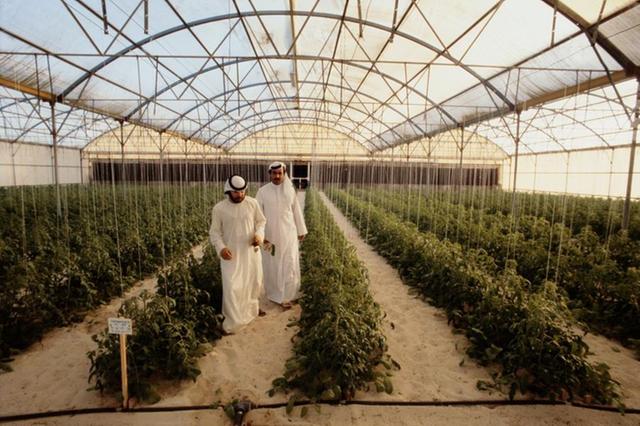The UAE government, under the leadership of the late Sheikh Khalifa bin Zayed Al Nahyan, supported the agricultural sector with a focus on promoting the cultivation of various food products to improve food security.
The UAE is located in an arid zone and desert environment accounts for more than three quarters of its total area. The country’s environment is characterised by low rainfall, high temperatures, poor soil and lack of natural waterways, all of which have a clear impact on the country’s agricultural sector.
Despite the challenges posed by these factors, the UAE under the leadership of Sheikh Khalifa, made outstanding efforts over the past decades to build an agricultural sector that is better able to contribute to food diversity and the national economy by adopting policies that limit the impact of these factors and adopt sustainable and climate smart agriculture methods that focus on the optimal utilisation of the cultivated land and the quality of local produce to enhance its competitiveness.
These policies are based on innovative technologies and solutions, such as hydroponics, aquaponics and organic agriculture, in addition to strengthening agricultural pest control programmes, reducing loss and waste throughout the food chain, and expanding interest in scientific studies and research in the agricultural field.
Huge efforts were made to preserve water resources, with emphasis on promoting the adoption and installation of modern irrigation systems to replace flood irrigation method, which wastes large amounts of water.
National system for sustainable agriculture
In 2020, the UAE Cabinet approved the national system for sustainable agriculture to improve the efficiency of farms, enhance self-sufficiency in food and create new opportunities to ensure that the agriculture sector is always ranked among the best. The national system for sustainable agriculture seeks to increase self-sufficiency from the targeted agricultural crops to 5 per cent annually, increase of average farm income to 10 percent annually, raise workforce in the sector by 5 per cent annually and achieve a 15 percent annual reduction in water used for irrigation of a production unit.
Organic farming
Emirates Authority for Standardisation and Metrology (ESMA) introduced an organic food certification scheme in February 2012, which comes with a logo by which consumers can easily distinguish organic products from conventional ones. About half of the 40 existing organic farms have already been certified and others are under process.
Award for date palm and agricultural innovation
Sheikh Khalifa placed the establishment of a date production industry as one of the country’s important priorities. There have been continuous efforts, including the establishment of the Khalifa International Awards for Date Palm and Agricultural Innovation and to increase agricultural productivity and to make better use of all available resources.
The Khalifa International Award for Date Palm and Agricultural Innovation was founded by Sheikh Khalifa as an appreciation to the innovators and workers in the agricultural and date palm sector, both in the UAE and other countries of the world, to recognise outstanding innovations and efforts targeting sustainable development of this sector for present and future generations.
The award aimed at establishing the UAE leading role in the cultivation of the valuable tree and development of date palm research worldwide and encourage researchers, growers, exporters and other interested personalities to lend more attention to the highly nutritional fruit.
Promoting the cultivation of palm trees has resulted in doubling the size of land allocated to date palm cultivation whilst encouraging date-related food products.



